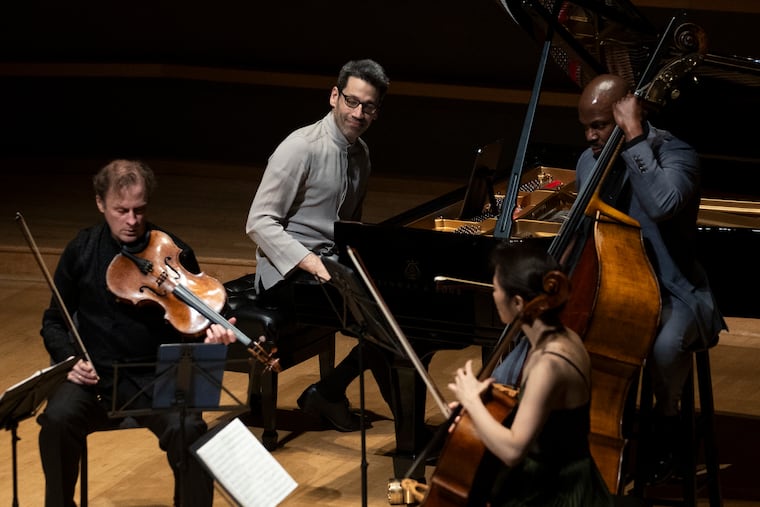What the world needs now is a seriously fun ‘Trout’ Quintet. That’s exactly what it got on Sunday at the Kimmel.
Jonathan Biss, Joseph Conyers, and the Brentano Quartet performed at the Philadelphia Chamber Music Society concert.

It’s Schubert, so you sit there waiting for it to happen — the slowly descending nervous breakdown, the moment when the thunder rolls in after you thought you were in the clear.
But in an age of complexity and anxiety, Schubert’s “Trout” Quintet offers this: simplicity, and not a dark cloud in sight. The successful performance underlines energy and optimism as animating forces in life, as members of the Brentano String Quartet and friends so beautifully showed Sunday afternoon in the Kimmel Center’s Perelman Theater.
Music has its party pieces, and none is more buoyant than this one. Especially next to its program companion, Beethoven’s mind-bender of a string quartet, the Opus 130 in B Flat, Schubert came across as a reward in the penultimate concert in the Philadelphia Chamber Music Society’s season.
The Schubert may have been unalloyed joy, but the Beethoven was the more impressive feat — both the performance and the composition itself. Among Beethoven’s last works, the Opus 130 is a mass of ambiguity — harmonically slippery, and almost treacherous in the way instrumental alliances form and fall away.
You might have quibbled with some of the individual playing that was less than fully polished (from violinist Mark Steinberg), but the Brentano’s ensemble work was astonishingly good. The group, which measures its history together in decades, gorgeously matched colors (wan to warm) as well as phrasing. When certain figures got passed from one instrument to the next in the third movement, it was done so seamlessly it thrilled. They even kept time in the silences, exquisitely unified in the first movement.
So lucid was the Brentano’s performance that it affirmed the delicious paradox of late Beethoven — that each additional performance seems to move us farther from understanding it. (May it ever be so.)
Three of the Brentanos were joined by Philadelphia Orchestra double bassist Joseph Conyers and pianist Jonathan Biss for the Schubert, and while the ensemble didn’t find a fully confident cohesiveness immediately, it did get there. There were lovely touches all over — in the way Biss floated melodies in the right hand, cellist Nina Lee’s soulful phrasing, the momentum of inevitability with which the entire ensemble endowed the first movement.
The ensemble was tighter in the fourth movement, which made possible deeper characterizations of the music, in turns earnest, playful, and poignant. Biss was particularly polished and exhilarating in his racing etude-like moment in the spotlight. Here it was obvious to the listener that ideas about interpretation had grown into something more evolved. You can’t always know what performers are thinking, but from the looks they gave each other after the movement ended, I think they knew, too.